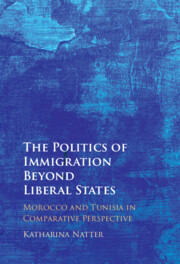Book contents
- The Politics of Immigration Beyond Liberal States
- The Politics of Immigration Beyond Liberal States
- Copyright page
- Dedication
- Contents
- Figures
- Tables
- Acknowledgements
- Note on the Text
- Abbreviations
- 1 Introduction
- 2 Theories on the Move
- 3 The Contrasting Cases of Morocco and Tunisia
- 4 Regime Continuity and Immigration Policy Change in Morocco
- 5 The Illiberal Paradox of Autocratic Policymaking
- 6 Regime Change and Immigration Policy Continuity in Tunisia
- 7 The Ambiguous Effects of Democratization
- 8 Immigration Politics and State Transformation
- 9 Conclusion
- Appendices
- Notes
- References
- Index
7 - The Ambiguous Effects of Democratization
Published online by Cambridge University Press: 12 January 2023
- The Politics of Immigration Beyond Liberal States
- The Politics of Immigration Beyond Liberal States
- Copyright page
- Dedication
- Contents
- Figures
- Tables
- Acknowledgements
- Note on the Text
- Abbreviations
- 1 Introduction
- 2 Theories on the Move
- 3 The Contrasting Cases of Morocco and Tunisia
- 4 Regime Continuity and Immigration Policy Change in Morocco
- 5 The Illiberal Paradox of Autocratic Policymaking
- 6 Regime Change and Immigration Policy Continuity in Tunisia
- 7 The Ambiguous Effects of Democratization
- 8 Immigration Politics and State Transformation
- 9 Conclusion
- Appendices
- Notes
- References
- Index
Summary
Chapter 7 dissects power dynamics among actors involved in immigration policy in Tunisia through the 2011 regime change: democratic state institutions and the administration; CSOs and migrant associations; international organizations, legal actors, and the private sector. I show how democratization affected immigration policy processes in ambiguous ways and explain why the increase in citizens’ political freedoms and civil society activism has not spilled over into more openness towards immigration. After 2011, policy processes became more inclusive, as the role of Tunisia’s parliament and civil society was strengthened. However, democratization also brought inter-actor dynamics to the fore that put a break to immigration reform plans, such as turf wars within the administration or governmental volatility. At the same time, the democratic transition has only partially affected immigration policymaking, as dynamics of international norm adherence and the ambiguous role of employers in Tunisia’s largely informal economy remained relatively unaffected by the regime change. In this context, political elites opted for restrictive policy continuity instead of translating migratory experiences and democratic ideals into liberal immigration reform.
Keywords
- Type
- Chapter
- Information
- The Politics of Immigration Beyond Liberal StatesMorocco and Tunisia in Comparative Perspective, pp. 165 - 197Publisher: Cambridge University PressPrint publication year: 2022



